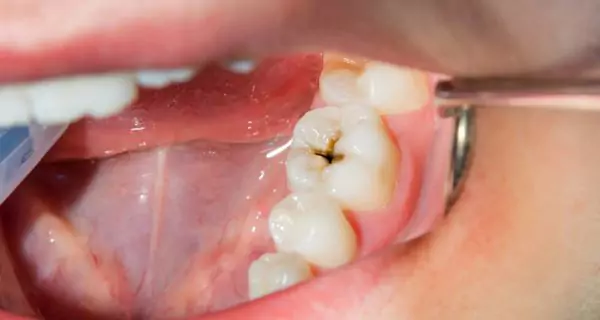Last Updated on: 19th September 2025, 12:30 pm
Celiac disease can affect your teeth by weakening enamel, causing discoloration, and increasing the risk of cavities and delayed dental development. These issues result from the body’s inability to absorb essential nutrients due to gluten intolerance.
When people think of celiac disease, digestive issues like bloating, diarrhea, and the necessity of a gluten-free diet come to mind. However, the effects of celiac disease extend beyond the digestive system, impacting various parts of the body, including the mouth. Oral manifestations can be the first indicators of the disease, even before gastrointestinal symptoms appear.
Understanding the connection between celiac disease and oral health is crucial for early diagnosis and proper dental care.
What is celiac disease?
Celiac disease is a chronic autoimmune disorder that triggers an immune response when a person consumes gluten, a protein found in wheat, barley, and rye. This immune reaction damages the lining of the small intestine, leading to poor nutrient absorption, including essential nutrients like iron, calcium, vitamin D, and B vitamins.
Beyond causing digestive problems such as diarrhea, gas, or abdominal pain, celiac disease can affect other parts of the body, including the skin, bones, nervous system, and notably, the mouth.
How celiac disease and teeth health are closely connected?
The mouth is one of the first places where signs of celiac disease show up, sometimes even before any stomach issues arise. Recognizing these symptoms can lead to an earlier diagnosis and help protect your oral health.
1. Dental enamel defects
Tooth enamel is the strong, protective layer that covers your teeth. In people with celiac disease, especially if the disease begins in childhood, it may not develop properly, a condition called enamel hypoplasia.
These defects are not caused by poor brushing or hygiene, but by how the body forms enamel during tooth development. According to the American Dental Association (ADA), enamel defects affect 40–50% of children with celiac disease, compared to only about 6% of children without it.
Enamel issues look like:
- white, yellow, or brown spots on multiple teeth
- grooves or pits on the surface of teeth
- teeth appear chalky or translucent
- fragile enamel that chips or wears down easily
2. Higher risk of cavities
When enamel is weak, teeth are less protected. This makes them more vulnerable to:
- frequent cavities, even with proper hygiene
- increased tooth sensitivity to heat or cold
- faster wear and tear
- more plaque buildup
Celiac disease also affects how the body absorbs important nutrients like calcium, vitamin D, and vitamin B12, all of which are vital for strong teeth and gums. Additionally, many people with celiac disease produce less saliva, which naturally helps protect the mouth from bacteria.
3. Mouth sores and irritation
Many people with celiac disease suffer from frequent discomfort in the mouth, especially if they accidentally eat gluten.
Common symptoms include:
- canker sores (aphthous ulcers) inside the cheeks, lips, or on the tongue
- inflamed or irritated gums
- a dry mouth feeling
- pain when eating acidic or hot foods
Because celiac disease slows down the body’s healing, these mouth sores may take longer to disappear; they tend to come back often, especially when nutrient levels are low or inflammation is active.
How Does Celiac Disease Affect Children’s Dental Health?
Childhood is a critical time for tooth development. When a child has undiagnosed or untreated celiac disease, it can disrupt the way their teeth grow, often showing signs in the mouth before any digestive symptoms appear.
Can Celiac Disease Delay Dental Development in Children?
Some children with celiac disease may experience:
- delayed eruption of baby teeth and permanent teeth
- teeth that are smaller than usual, or oddly shaped
- enamel that doesn’t fully form, leading to spots or weak surfaces
- roots that don’t develop completely, affecting tooth stability
These issues can affect the way a child chews, speaks, or even smiles. In many cases, a dentist may be the first person to suspect celiac disease just by noticing these patterns during a routine check-up.
Why Is Early Detection of Celiac Disease Important for Oral Health?
Because dental signs appear early and without stomach problems, they should not be ignored. Parents who notice unusual changes in their child’s teeth, such as staining, delays in tooth growth, or frequent ulcers should mention them to both the dentist and pediatrician.
Early testing for celiac disease can lead to faster treatment, better nutrition, and a healthier, more confident smile as the child grows.
Oral care tips for people with celiac disease
Taking care of your mouth is important for everyone, but for those with celiac disease, there are some extra steps to protect their teeth and gums. Here are simple and effective ways to keep your smile healthy.
1. Should You Stick to a Gluten-Free Diet for Dental Health?
This is the most important step, not just for your gut, but for your entire body, including your mouth.
By eliminating gluten:
- you reduce inflammation
- your body absorbs nutrients better
- your mouth can start to heal, especially if you had frequent sores or weak enamel
If you’re newly diagnosed, it might take a few months of eating gluten-free before you notice improvements in your oral health.
2. How to Choose Gluten-Free Dental Products?
Some oral hygiene products (like toothpaste or mouthwash) may contain gluten in flavorings or binding ingredients. While the risk of absorption is low, accidental exposure, especially in sensitive individuals, can still cause symptoms.
Look for products clearly labeled “gluten-free.”
Recommended options:
- Toothpastes: Tom’s of Maine, Hello Oral Care, Sensodyne (gluten-free versions)
- Mouthwashes: TheraBreath Mild Mint, Biotène Dry Mouth Oral Rinse
- Remineralizing products: Periosciences AO Pro Natural Toothpaste and Auromere Ayurvedic mouthwash.
Tip: Always check the label or contact the brand. Ingredients can change.
3. Why Is Monitoring Nutrient Levels Important for Oral Health?
Talk to your doctor about checking for vitamin and mineral deficiencies as calcium, vitamin D, iron and Vitamin B12.
If levels are low, your doctor may recommend supplements to help:
- strengthen your enamel
- reduce inflammation and gum pain
- prevent recurring mouth sores
Improving your nutrition often improves oral health, too.
4. How Often Should You Visit the Dentist If You Have Celiac Disease?
Let your dentist know that you have celiac disease. Many dentists are aware of the oral signs of gluten-related conditions and can track changes in your teeth and gums.
Your dentist can:
- spot signs like enamel loss, gum inflammation, or mouth sores
- apply fluoride treatments or sealants to protect your teeth
- recommend more frequent cleanings (every 3–4 months if needed)
- advise you on the best products for your condition
If you have kids with celiac disease, regular dental checkups are especially important to monitor their tooth development.
Celiac disease’s impact extends beyond the digestive system, significantly affecting oral health. Tooth discoloration, frequent cavities, delayed dental growth, and painful sores are all early signs of gluten intolerance, especially in children.
By maintaining a strict gluten-free diet, using appropriate dental products, and ensuring regular medical and dental care, individuals with celiac disease can preserve their oral health and overall well-being.
Don’t forget that oral health isn’t just physical. For many people, problems like visible spots or crooked teeth can affect self-esteem and confidence. Caring for your smile is about more than just brushing; it’s about helping you feel better, inside and out.
Frequently Asked Questions
Are dental problems reversible once I start a gluten-free diet?
Can a dentist detect celiac disease?
Can celiac disease cause bad breath?
Can I use fluoride if I have celiac disease?
How soon after going gluten-free will my oral symptoms improve?
Voice and Search (Q&A)
What are the early dental signs of celiac disease?
Early signs include white, yellow, or brown spots on teeth, grooves in the enamel, delayed tooth eruption, and frequent mouth sores.
Can a gluten-free diet help improve oral health in celiac disease?
Yes. A strict gluten-free diet reduces inflammation, improves nutrient absorption, and helps heal mouth sores. However, enamel defects are permanent but manageable with dental care.
What dental products should people with celiac disease use?
Use toothpaste and mouthwash labeled gluten-free, such as Tom’s of Maine or TheraBreath. These reduce the risk of accidental gluten exposure while supporting oral health.
Share
References
1. ADA. (n. d). Celiac disease. American Dental Association. https://www.ada.org/resources/ada-library/oral-health-topics/celiac-disease
2. Amato, M., Zingone, F., Caggiano, M., Iovino, P., Bucci, C., & Ciacci, C. (2017). Tooth Wear is Frequent in Adult Patients with Celiac Disease. Nutrients, 9(12), 1321. https://www.mdpi.com/2072-6643/9/12/1321
3. Guandalini, S., Rivera, E. (2017, July 11). Celiac Disease and Oral Health: What Dentists Need to Know. Celiac Disease Foundation. https://celiac.org/2017/07/11/celiac-disease-oral-health-dentists-need-know/
4. Malahias, T. (n. d). Oral health. Celiac Disease Foundation. https://celiac.org/about-celiac-disease/related-conditions/oral-health/
5. Wieser, H., Amato, M., Caggiano, M., & Ciacci, C. (2023). Dental Manifestations and Celiac Disease—An Overview. Journal of Clinical Medicine, 12(8), 2801. https://www.mdpi.com/2077-0383/12/8/2801
-
Dr. Yeidy Carolina Mesa [Author]
DDS Yeidy Carolina Mesa Passionate Dentist | Advocate for Accessible Oral Health Education Graduating from Universidad CES in 2022, I am a dedicated general dentist with a lifelong passion for helping others and making a meaningful impact in the world. My journey into dentistry began at the age of 7, inspired by my own experience with braces and overcoming a fear of the dentist. This personal journey shaped my mission to help patients conquer their own dental anxieties and embrace a healthier,...
View all posts
-
Nayibe Cubillos M. [Medical Reviewer]
Pharmaceutical Chemestry |Pharmaceutical Process Management | Pharmaceutical Care | Pharmaceutical Services Audit | Pharmaceutical Services Process Consulting | Content Project Manager | SEO Knowledge | Content Writer | Leadership | Scrum Master
View all posts
A healthcare writer with a solid background in pharmaceutical chemistry and a thorough understanding of Colombian regulatory processes and comprehensive sector management, she has significant experience coordinating and leading multidisciplina...





















